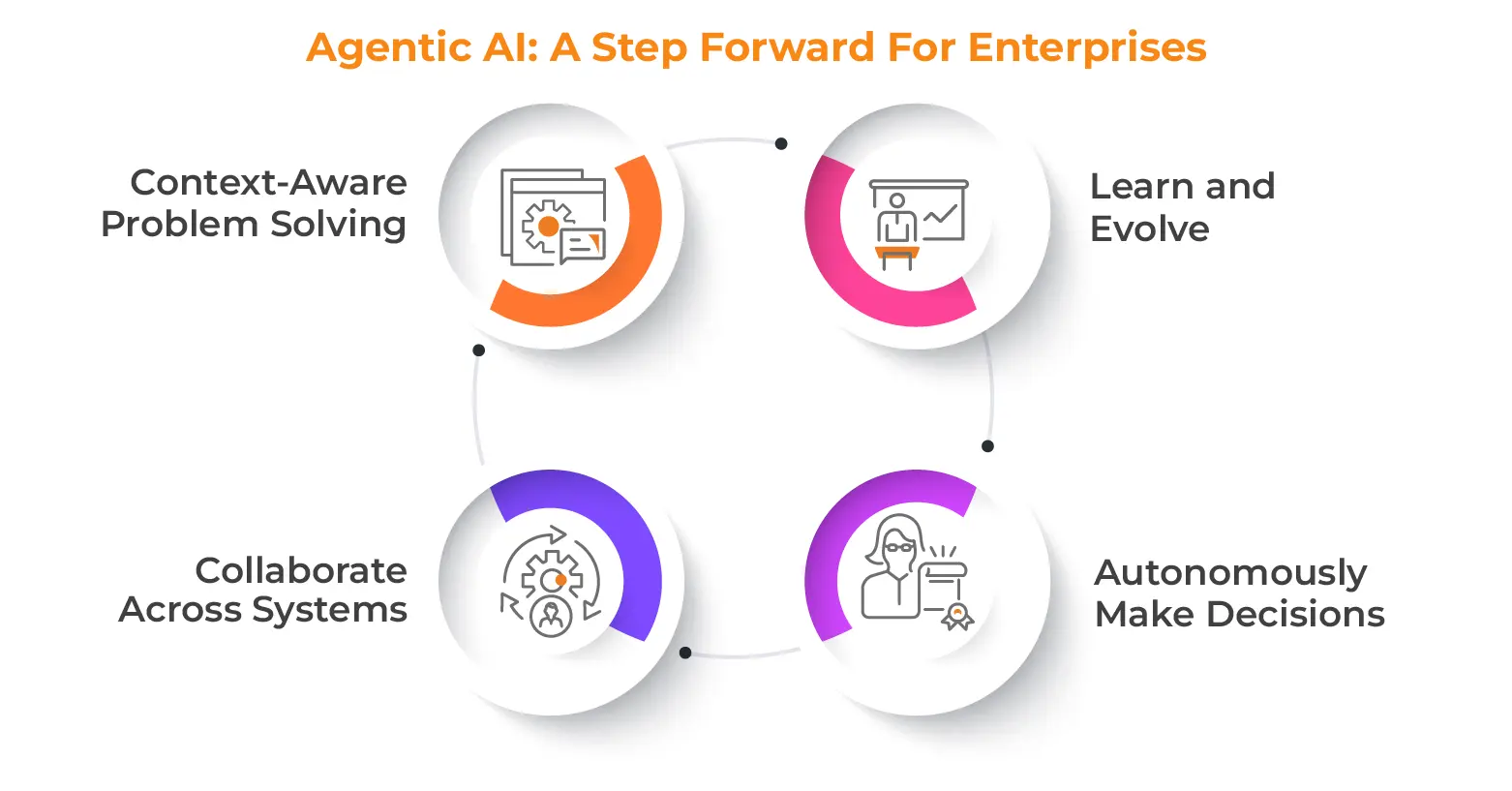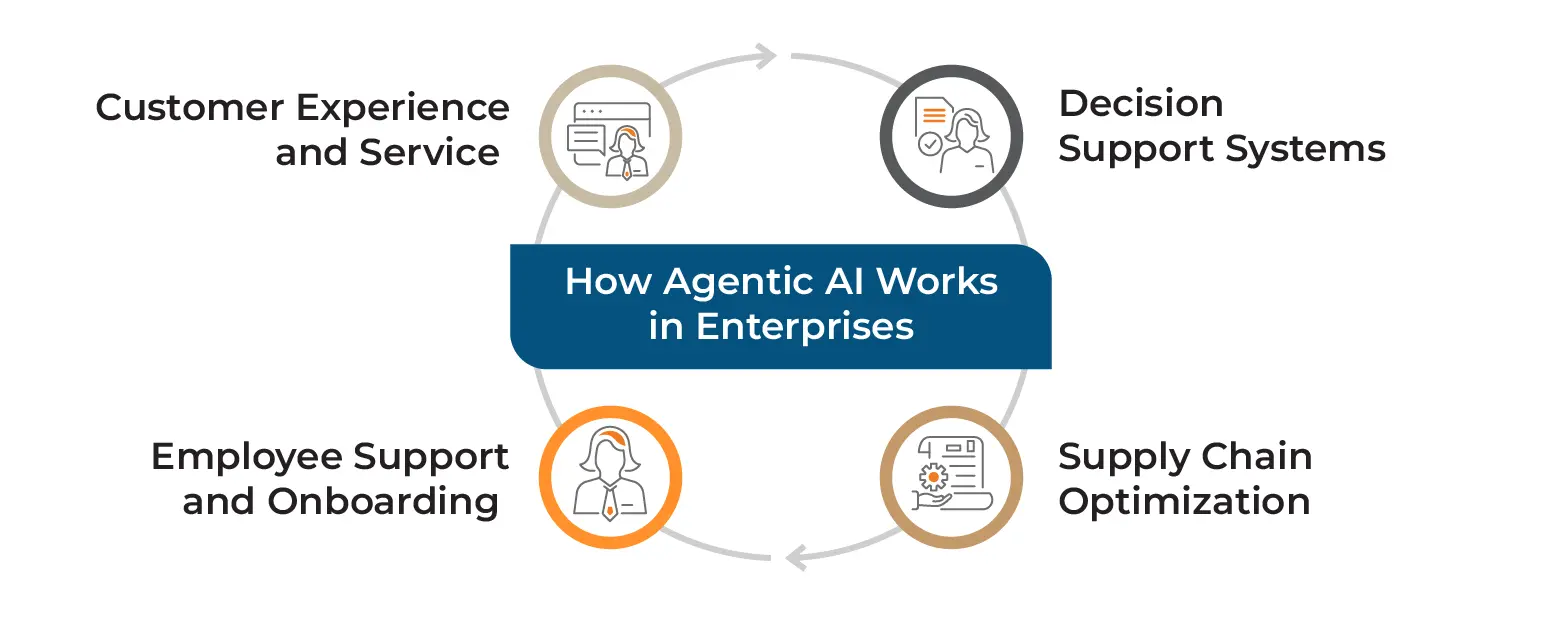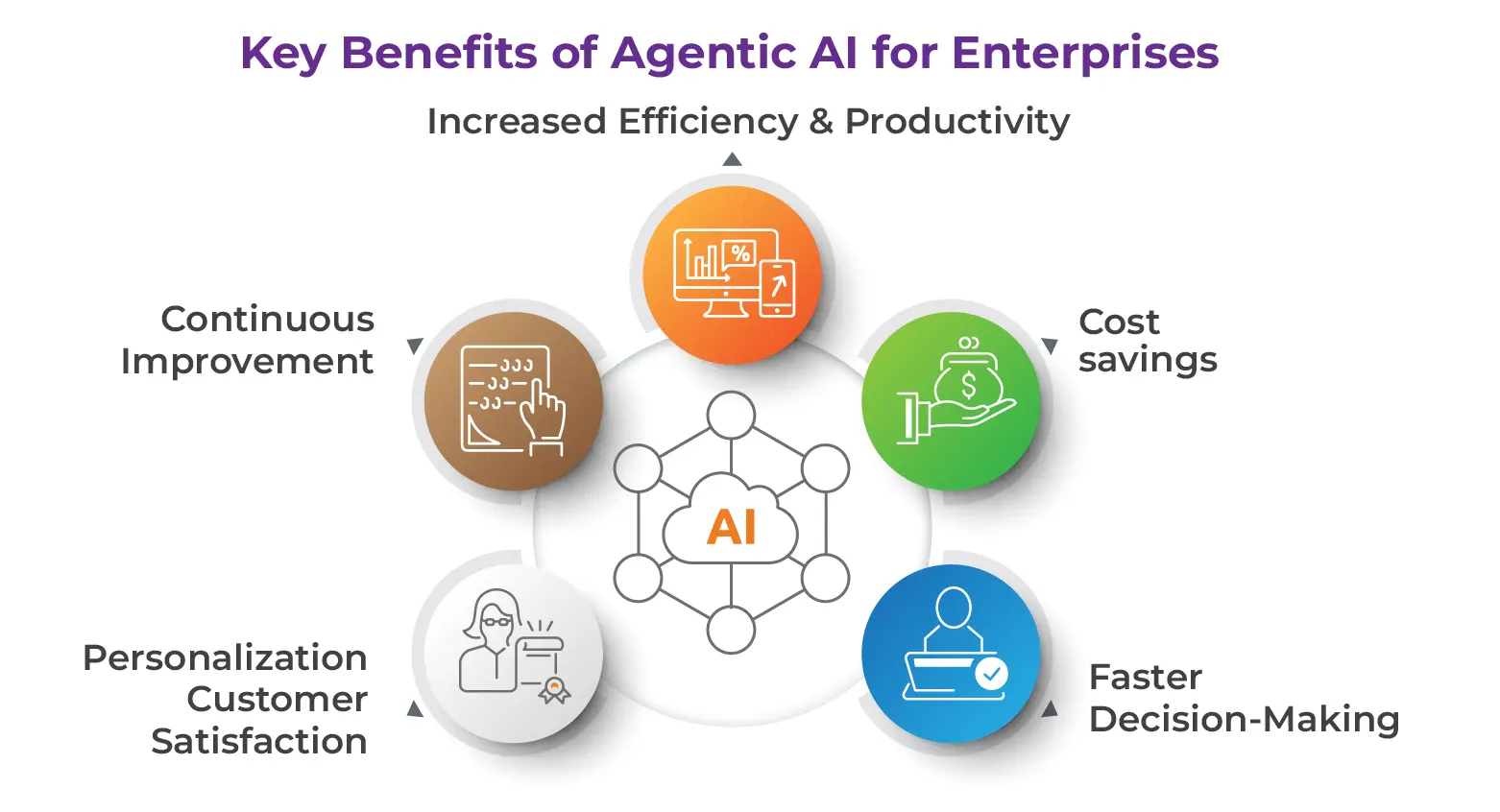Understanding Agentic AI: A Game-Changer for Enterprises
In today's digital landscape, Agentic AI represents both a transformative opportunity and a critical challenge for enterprises struggling with operational inefficiencies and technological adaptation. As per reports, companies that fail to implement advanced AI technologies could lose up to 20-30% in productivity compared to early adopters. The economic implications are also staggering [...] The post Understanding Agentic AI: A Game-Changer for Enterprises appeared first on AutomationEdge.

In today’s digital landscape, Agentic AI represents both a transformative opportunity and a critical challenge for enterprises struggling with operational inefficiencies and technological adaptation. As per reports, companies that fail to implement advanced AI technologies could lose up to 20-30% in productivity compared to early adopters. The economic implications are also staggering as Gartner estimates that by 2025, enterprises not leveraging autonomous AI agents could experience revenue losses approaching $15.7 trillion in potential value creation.
Table of Contents
Table of Contents
The Evolution from Traditional Automation to Agentic AI
Before diving into Agentic AI, it’s essential to understand the limitations of traditional automation. For years, enterprises have leveraged Robotic Process Automation (RPA) and other AI-based solutions to streamline repetitive tasks. These systems have been successful in automating predefined processes such as data entry, invoice processing, and customer query handling. However, traditional automation tools have their drawbacks:
- Limited Flexibility: They perform well with structured, repetitive tasks but struggle with unstructured environments.
- Rule-based: They follow strict rules and workflows that need frequent updates if any process changes occur.
- Minimal Learning: Traditional automation systems don’t learn from their actions or adapt to new conditions without manual intervention.
Agentic AI: A Step Forward For Enterprises
Agentic AI solves many of these challenges by introducing autonomous agents that can independently analyze complex scenarios and adapt to changes without requiring constant reprogramming. These agents can:

- Learn and Evolve: With embedded machine learning capabilities, agents can adapt based on past experiences and outcomes.
- Autonomously Make Decisions: They operate with a level of autonomy, making decisions in real-time to optimize workflows.
- Collaborate Across Systems: Agents can communicate with other agents, humans, and systems to complete end-to-end tasks, from data collection to decision-making.
- Context-Aware Problem Solving: Agentic AI can understand and interpret contextual information, allowing it to handle unstructured and dynamic environments more effectively.
How Agentic AI Works in Enterprises
Agentic AI operates within a multi-agent system, where individual agents are designed to handle specific functions but collaborate for more comprehensive solutions. Here’s how it fits into different aspects of enterprise operations:

-
Decision Support Systems
In sectors like finance, healthcare, and manufacturing, Agentic AI-powered systems assist decision-makers by analyzing vast datasets and providing actionable insights. For example, a financial institution might deploy Agentic AI to monitor market trends, assess risks, and suggest investment opportunities based on real-time data.
Example: A bank can leverage Agentic AI agents for portfolio management. The AI agents continuously analyze stock market movements, economic indicators, and client preferences, recommending portfolio adjustments that align with the bank’s risk management goals. What makes Agentic AI stand out is its ability to not only generate reports but also offer proactive suggestions for financial advisors.
-
Supply Chain Optimization
For manufacturing and retail enterprises, supply chain management is crucial, and any inefficiencies can result in lost revenue and customer dissatisfaction. Traditional systems rely on static models for inventory management and demand forecasting, but Agentic AI adds a layer of intelligence by dynamically adjusting decisions based on real-time data, such as consumer demand, shipping delays, and supplier behavior.
Example: Agentic AI is deployed to optimize the supply chain in an electronic company. The system continuously monitors production levels, supplier performance, and logistics, autonomously making decisions to reroute shipments or adjust production schedules to avoid bottlenecks. The AI agents predict shortages and automatically reorder materials from the most reliable suppliers to ensure the smooth running of the supply chain.
-
Customer Experience and Service
Enterprises are increasingly using AI-powered chatbots for customer service. While traditional chatbots can manage routine inquiries, Agentic AI enhances customer experience by personalizing interactions, understanding context, and offering proactive solutions. These agents can integrate with backend systems, allowing them to go beyond responding to basic queries and autonomously solve complex customer issues, initiate processes like refunds, or provide relevant product recommendations.
For instance, an insurance company deploys Agentic AI in its customer support center. When a customer inquires about a claim status, the AI not only retrieves information but also analyzes the claim’s progress, detects potential delays, and provides updates accordingly. If any steps are pending from the customer’s side, the AI offers actionable suggestions, such as submitting additional documentation, to speed up the process.
-
Employee Support and Onboarding
In enterprises with large workforces, managing employee support—such as handling IT issues, HR inquiries, and onboarding processes—can become overwhelming. Agentic AI enhances employee support systems by automating tasks like IT ticket handling, policy updates, and employee self-service. Through contextual understanding, the AI agent provides relevant information and solutions without human intervention, saving time and improving productivity.
An IT company can use Agentic AI to automate the employee onboarding process. From sending welcome emails to setting up IT access and delivering personalized training modules, the AI agent handles the entire onboarding journey. By interacting with HR, IT, and payroll systems, the AI ensures that the new hire has everything they need, while learning from previous onboarding experiences to improve the process over time.
Key Benefits of Agentic AI for Enterprises
-
Increased Efficiency and Productivity
Agentic AI agents can work around the clock without fatigue, handling multiple processes simultaneously. This reduces human error and allows employees to focus on more strategic tasks that require creativity and human judgment.
-
Cost Savings
By automating complex workflows and decision-making processes, enterprises can cut operational costs associated with manual processes, rework, and delays. Agentic AI offers scalability that allows enterprises to grow without proportionally increasing resource allocation.
-
Faster Decision-Making
Agentic AI can process and analyze vast amounts of data in real-time, enabling quicker and more accurate decision-making. This is particularly beneficial in fast-paced industries like finance and retail, where timely decisions can be the difference between profit and loss.

-
Personalization and Customer Satisfaction
Agentic AI enhances customer experience by offering personalized interactions and proactive solutions. This level of customization helps improve customer satisfaction and retention, key metrics for business growth.
-
Continuous Improvement
One of the most significant advantages of Agentic AI is its ability to learn and improve over time. These systems use machine learning algorithms to adapt to new data and changing environments, ensuring that their performance gets better with each interaction.
Examples of Agentic AI in Action
-
Healthcare:
In healthcare, Agentic AI is used to manage patient data, schedule appointments, and even assist in diagnostics. AI agents can autonomously handle patient inquiries, gather medical histories, and suggest preliminary diagnoses based on symptoms and test results. This helps medical professionals prioritize urgent cases and streamline administrative tasks.
-
Financial Services:
As mentioned earlier, Agentic AI is revolutionizing the finance industry by providing autonomous investment advice, managing client portfolios, and even automating compliance checks. In addition, AI agents monitor global markets, regulatory changes, and client profiles to ensure portfolios are optimized and compliant with industry standards.
-
Retail and E-commerce:
In retail, AI agents are used for personalized product recommendations, inventory management, and demand forecasting. By analyzing customer behavior, purchase patterns, and market trends, these agents optimize marketing strategies and stock levels, ensuring that the right products are available at the right time.
-
Manufacturing:
Agentic AI optimizes production lines, manages quality control, and ensures that machinery is operating efficiently. In smart factories, AI agents work in tandem with IoT devices to monitor production processes, identify bottlenecks, and prevent equipment failures by triggering predictive maintenance.
Challenges and Considerations while Applying Agentic AI
Despite its many benefits, implementing Agentic AI comes with its own set of challenges:
-
Integration with Legacy Systems:
Many enterprises still operate on outdated systems that may not easily integrate with Agentic AI platforms. Overcoming this hurdle requires careful planning and often, additional investment in IT infrastructure.
-
Data Privacy and Security:
Since Agentic AI relies heavily on data, protecting sensitive information is paramount. Enterprises must ensure robust security measures are in place to safeguard against potential breaches.
-
Regulatory Compliance:
Different industries have varying regulations, and deploying AI solutions that comply with these can be complex. Enterprises need to ensure their AI agents adhere to regulatory standards and industry best practices.
Conclusion
Agentic AI represents a new frontier in enterprise automation, offering capabilities that go beyond what traditional AI systems can deliver. With the ability to autonomously manage complex workflows, adapt to new information, and provide actionable insights, Agentic AI is set to transform industries across the board.
By adopting Agentic AI, enterprises can enhance efficiency, reduce costs, and unlock new opportunities for growth. As more businesses turn to AI to solve their most pressing challenges, Agentic AI will play a critical role in shaping the future of enterprise operations. Whether it’s customer service, supply chain management, or decision support, Agentic AI is the game-changer that businesses need to stay competitive in an increasingly digital world.
Frequently Answered Questions
The post Understanding Agentic AI: A Game-Changer for Enterprises appeared first on AutomationEdge.


 Editor-Admin
Editor-Admin 





